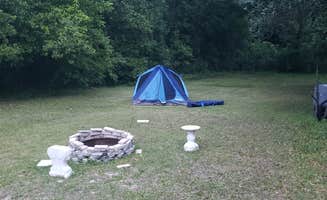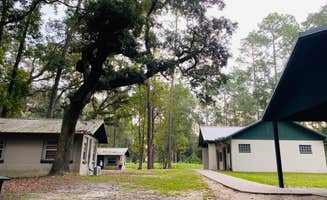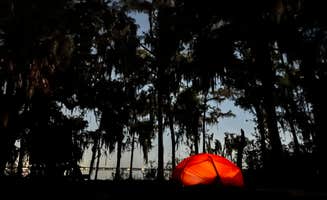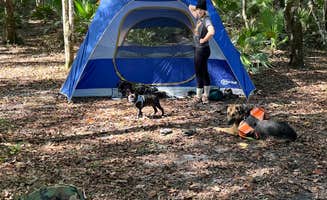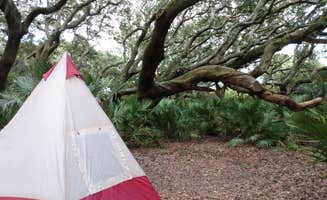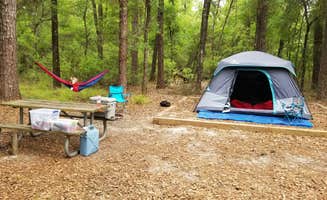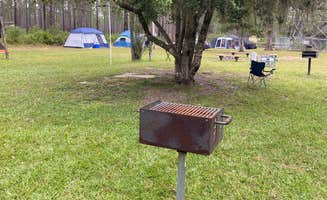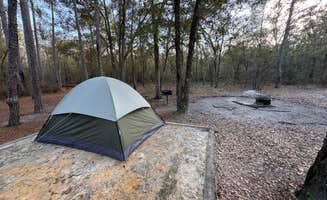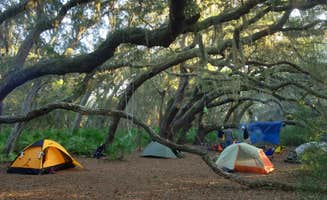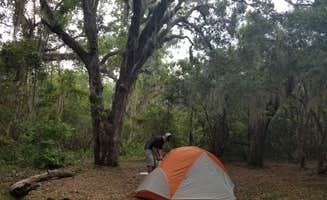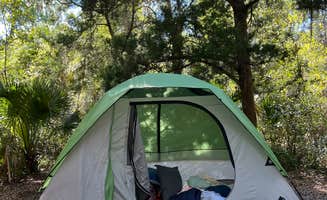Tent camping near Jacksonville Beach, Florida spans diverse ecosystems from inland forests to barrier islands. The region's subtropical climate creates year-round camping opportunities with cooler, less humid conditions from October through April. Most primitive campgrounds require hikers to pack water and essential supplies, with limited or no potable water sources available beyond established facilities.
What to Do
Kayak Black Creek: At Black Creek Ravine, campers can enjoy paddling directly from their campsite. "It is about 30 feet through some trees to the river, so if you were clever, I'm sure you could find it from a boat," notes camper Nate D., who appreciated the campsite's seclusion and water access.
Explore historic sites: The former Girl Scout camp at Camp Chowenwaw Park offers unique historical features. "There was a Girl Scout Museum near the main office where you check in—but is rarely open. This was an old girl scout camp and now is open to the public," explains Jeanene A., who enjoyed the park's preserved structures and history.
Night hiking: The extensive trail system at Jennings State Forest provides excellent night hiking opportunities. "The night trails are amazing," writes April L. about Dutton Island Preserve, while warning: "definitely bring insect repellant no matter the time of year and also keep all valuables in your car."
What Campers Like
Elevated camping experiences: Camp Chowenwaw Park offers unique accommodations. "The treehouses were so fun to stay in and being higher up gave us chances of a breeze—many in our group brought battery operated fans," writes Jeanene A., who appreciated this distinctive camping style during Florida's warm months.
Remote beach access: Stafford Beach Campground provides a quieter alternative to more popular sites. "We slept under spanish moss covered trees and had a beach to ourselve during the day. It really felt like we had this gorgeous barrier island just for us. We came on Labor day weekend and only saw one other person on the beach," shares Christy P.
Wildlife encounters: The primitive sites at Bayard Conservation Area offer excellent wildlife viewing. "On our way to our campsite we were able to spot many animals including: deer, otter, turkey, and wild pigs," notes Jenn B., who found the area clean and well-maintained despite its remote nature.
What You Should Know
Ferry logistics: For Cumberland Island camping, ferry planning is essential. "Whatever supplies you choose to go camping with, you will need to 'wheel it on' the actual ferry, which likely requires a hard examination of what really is essential versus 'nice-to-have'," advises Stuart K., who recommends purchasing tickets well in advance.
Navigation challenges: Matanzas State Forest requires careful attention to directions. "I have yet to find any place that you can feel so lost within just a 10 minute drive from one of the busiest highways in America than Matanzas State Forest. Once exiting I95 on Rt. 206 you'll want to head east and within 3 minutes you'll hit US1," explains Stuart K., warning that GPS often sends campers to the wrong location.
Seasonal considerations: Jacksonville Beach tent camping varies dramatically by season. "We went in March and it got pretty chilly at night, but the fire pit helped us stay warm," reports Lizzy about Jennings State Forest, contrasting with summer experiences where humidity and heat are significant factors.
Tips for Camping with Families
Pool access requirements: Princess Place Preserve provides recreational facilities with specific rules. "The only downside was the fact that they are very strict at the pool. The children had to do swim tests and wear a necklace denoting which portion of the pool they could be in," explains Jenn B., providing helpful information for parents planning activities.
Short trails for young hikers: Many conservation areas feature kid-friendly hiking options. "The camp has a fun trail to hike with a wooden bridge over the swamp," notes Sean B. about Camp Chowenwaw, which combines educational opportunities with manageable distances for children.
Prepare for wildlife encounters: Campgrounds throughout the region feature abundant wildlife that fascinates children. "Elsewhere in the island are all sorts of other animals such as wild boar, wild horses, deer, and various types of birds, just to name a few. The resident volunteer led an info session on armadillos which was educational and fun and really added value to our trip," shares Marian K. about Cumberland Island.
Tips from RVers
Limited RV access: Most Jacksonville Beach tent camping areas have restrictions for large vehicles. "It was dirt roads not really trails, the bathroom looks like it belongs on a horror movie," reports Geoffrey S. about Bayard Conservation Area, indicating the challenging terrain for RVs.
Site selection for small RVs: At Jennings State Forest, smaller rigs can access limited sites. "I stopped here to stay overnight on a Thursday as I was passing through. There was only one camper but did not know that until I left the next morning. It was quiet and felt secluded," writes Amber R., noting the privacy between sites despite their proximity.
Seasonal road conditions: Access roads deteriorate during rainy seasons. "The dirt roads that lead in were very muddy. Small cars may have a hard time in rainy season," warns leena about Dutton Island Preserve, a concern that applies to RVs throughout the region's conservation areas.


